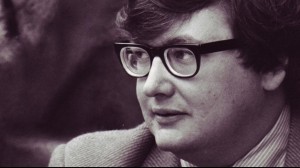Fuse Remembrance: A Tribute to Roger Ebert
In the end, it is not the brilliance of his criticism or the strength of his prose for which we will remember Roger Ebert, but his humanity and his love—for film, for life, and, most of all, for people.
By Jonathan Hawley.
Any person of my generation who has ever claimed to love movies in any serious way owes something to Roger Ebert, who died today in Chicago. He was 70. Even those who didn’t grow up, as I did, watching his verbal sparring with the late Gene Siskel or reading his reviews with the reverence usually reserved for sacred texts are nevertheless indebted to him for not only helping to bring film criticism into the mainstream but for reminding us that to appreciate film requires more than knowledge of shot composition and narrative technique. To be a proper critic, the most important quality is a genuine love for the medium itself.
Ebert used that love, and the influence it inspired, to great ends. He promoted new artists and independent filmmakers, giving them valuable publicity and attention in the popular consciousness. He compiled lists of his “Great Movies,” introducing countless novices and fledgling cinephiles to the great classics of film, from The Cabinet of Dr. Caligari to L.A. Confidential. He even had the intellectual courage to admit his mistakes if time or his own evolving views changed his opinion on a given film; he once remarked that he was “uninterested in being ‘consistent.’” (That’s not to say he didn’t have the courage of his convictions; even as Blue Velvet, for instance, has become a cult masterpiece, to the end he steadfastly refused to withdraw his original objections to the film.)
He taught us that critics don’t need to be objective, that indeed enjoyment of a film can sometimes be the most important factor in assessing its quality. His opinions weren’t populist as much as they were keenly informed by the very reason we go to the movies: entertainment, the chance to become lost in another world for a couple of hours. His passion informed everything he wrote, and his criticism was stronger because he loved what he saw.
This is not to say that his approval was a given. Indeed, we all enjoyed his wrath almost as much as his praise. His takedowns of unworthy movies, often deserved, sometimes not, are enshrined in the annals of criticism. At times he would phrase his anger in unforgettably creative terms; in describing 2008’s The Spirit, he wrote, “To call the characters cardboard is to insult a useful packing material.” On other occasions, such as in his review of 1994’s North, he would forgo wit in favor of a more a direct approach: “I hated this movie. Hated, hated, hated, hated, hated this movie. Hated it.”
But to call him a venomous critic would be unfair. Unlike some of his colleagues, his vitriol never came from a place of loathing or malevolence. He was never interested in tearing others down in order to raise himself up. He simply had high expectations for what he saw on the screen, and, most important of all, faith in the artists and performers who brought it to life. When that faith was betrayed, he would respond appropriately.
Over the past 10 years, suffering from cancer and disfigurement and robbed of the voice that we all knew so well, Ebert transformed himself in a most unexpected and compelling manner. Rather than choosing seclusion or seeking pity, he instead decided to expand his enthusiasm for film into an all-encompassing endorsement of life itself. He wrote about cooking, about love, about politics, and about mortality. He challenged a society plagued by violence and spite to live up to the potential that he knew it possessed. He held all of us to a higher standard, one that we should continue to strive for even though he is no longer with us.
Ebert did not fear death. In 2010 he wrote, “I was perfectly content before I was born, and I think of death as the same state. What I am grateful for is the gift of intelligence, and for life, love, wonder, and laughter. You can’t say it wasn’t interesting.”
And the end of his review of 1993’s Searching for Bobby Fischer, a film that, like Ebert’s life, celebrated the triumph of goodness over contempt, he wrote, “What makes us men is that we can think logically. What makes us human is that we sometimes choose not to.” In the end, it is not the brilliance of his criticism or the strength of his prose for which we will remember Roger Ebert, but his humanity and his love—for film, for life, and, most of all, for people.
Here is another, more critical view of Roger Ebert on The Arts Fuse.


Thank you for an eloquent piece about Roger Ebert’s passing. My daughter used to get annoyed with me when I would check out Roger’s reviews before we watched something on Netflix or got a DVD at the store. She’d say …why do you pay so much attention to what one guy has to say about a movie? I kept on trying to explain to her that I valued his words as much as I valued a good film. His criticism was an art form in and of itself. Two thumbs up for Roger. He will be missed.